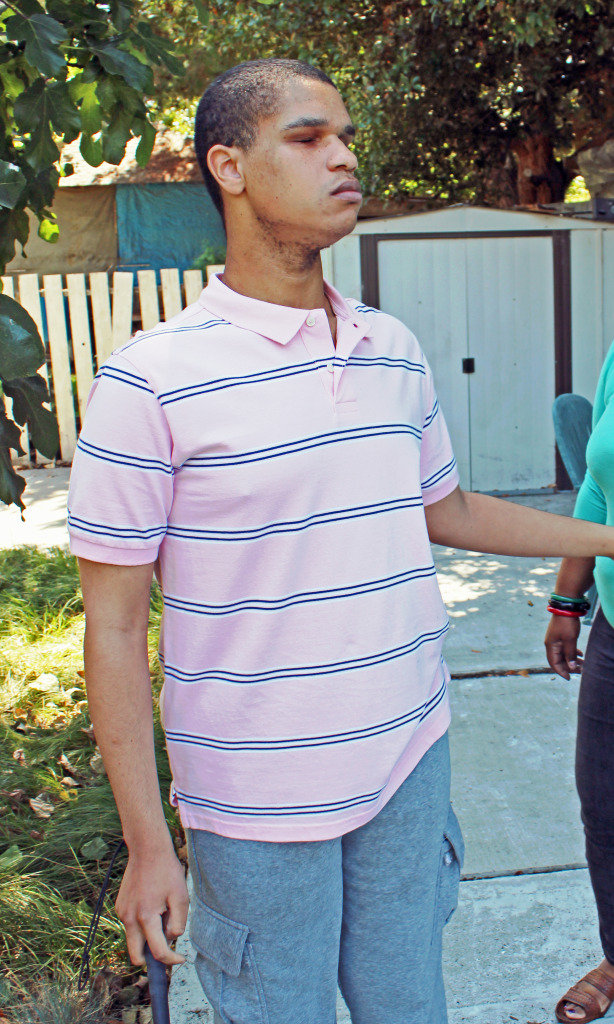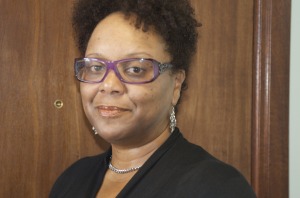Mom Keeps Fighting for Son in Berkeley High Special Education
Sep 27, 2014
Posted in Berkeley, Education/Schools/Youth, Equal Rights/Equity

By J. Douglas Allen-Taylor
Nineteen-year-old Berkeley High student Anthony Gaines sits inside a room beyond our understanding within his own mind and wonders why one of his best friends, his mentor, and his constant daytime companion of three years has now deserted him.
At least, we believe that’s what Anthony Gaines is thinking. Anthony is non-verbal, has been blind since birth and began losing most of his hearing soon afterwards, and so while his thoughts may be complex, he is only able to express them in the most restricted of forms.

He has been diagnosed with Norrie Syndrome, a rare genetic disease. Because of Anthony’s limited ability to communicate with the world, no-one is able to explain to him that his longtime mentor has not deserted him at all, but has been transferred from responsibility for his care by the helper’s employers, Berkeley High School.
Anthony’s mother, Stacey Rodgers, has an additional reason why she can’t give her son an explanation.
“I can’t tell him why Linnette isn’t working with him any more because I don’t know, myself,” Rodgers said. “They haven’t told me anything other than that they have the authority to transfer her.”
The Linnette that Rodgers is talking about is Linnette Robinson, an Instructional Assistant (IA) at Berkeley High School. As a special needs student, Anthony is eligible to attend public school until he is 22. He attends Berkeley High because he lives full time at Build House, a West Berkeley home for children with severe disabilities.
Rodgers, a single mother, does not live with him, but visits with him several times a week.
While a lead teacher runs the classroom in which Anthony spends his day at Berkeley High, the Instructional Assistant must be at his side constantly while at school, including getting him to and from the bus and the bathroom and overseeing his eating at lunch and snack times.
His IA is his lifeline to the world.
When Robinson first met Anthony at Berkeley High School four years ago, he had been assigned to another IA. “At the time, nobody wanted to work with Anthony because he would have violent outbursts.”
The problem was, Robinson later learned, that neither the teacher nor the instructional assistant assigned to Anthony were communicating with him. “They weren’t signing with him,” she said.
Signing is a particular challenge in communicating with deaf-blind individuals. While a deaf sighted person can see both the familiar standard American Sign Language hand signals as well as the physical expressions and mannerisms of the person they are “talking” with, a deaf-blind person uses a special form of that sign language done exclusively by hand contact.
Anthony has access to a cochlear implant that allows him hearing in one ear, but an earlier device frequently malfunctioned, and he has had trouble adapting to its replacement.
“If he was wearing his cochlear implant, they would simply give him orders, versus him being able to communicate back to them,” Robinson said. “He had no way of releasing any information.”
Robinson was soon assigned to take over instructional assistant responsibilities for Anthony.

The first thing she said she did was to ask the lead teacher in the class: “What sign language does Anthony use? What words does he know? And the teacher didn’t know. Nobody had told him.
“So I started working with Anthony to do things like say that he had to go to the bathroom. I started getting him to walk up and down the hallway until he could do it on his own.”
Robinson began to see progress: “We got to the point where we would sit there arguing back and forth using sign language. The other staff members couldn’t believe it. They didn’t know he could do things like that.
“We had progressed to the point where Anthony’s mother said he had signed to her that he needed to go to the bathroom, and then got up and went. He’d never done that before.”
Anthony’s mother had made formal complaints to Berkeley school officials about Anthony’s educational environment during his first year at Berkeley High. Although Rogers continued to press Berkeley High School officials to add more items to her son’s learning day, she held off on formal complaints after Robinson took over as Anthony’s IA and she began to see him progressing at the school for the first time.
At the same time, his outbursts and acting out at school decreased dramatically. But then abruptly after three years of progress, without prior warning to either Robinson or Rodgers, Robinson was taken off Anthony’s assignment at the beginning of the 2013-14 school year.
In a complaint filed with Berkeley Unified School District in January of this year, Rodgers wrote that “Anthony had formed a trusting relationship with [Robinson] and had progressed well under her instruction. I was promised [by school officials] that the new IA was trained in sign language and that [Robinson] would train the new person so that a transition…would occur.”
“Both things…were lies,” she continued. “The first week of school my son worked with a substitute Instructional Assistant. In the first month of school my son experienced a new untrained classroom teacher (no deaf/blind training), a new classroom in a new building, and an IA with absolutely no training.”
Responding, Berkeley Unified School District Public Information Officer Mark Copland called the Robinson complaint “ancient history,” adding that the Berkeley School Board had already upheld Robinson’s transfer from working with Anthony.
Copland did not return several phone messages asking to speak with someone at Berkeley High with direct knowledge about Anthony’s case.
While Robinson wants to be returned to work with Anthony, she said she has been told by school officials that they want to use her skills with other children. However, she has her own theory about her reassignment.
“It’s because I talk to Stacey,” Robinson said, explaining, “I think it’s a Black-White thing. I’ve seen a number of Caucasian kids – if their parents don’t want a particular staff member on their case, they take them off their case. If they say they want something for their student, they get something for their student.”
“Since Stacey is a fighter, they’re going to show her she’s not going to get what she wants,” Robinson said. “They told me before I met her that she was crazy, but after I met her, I found out all she was trying to do was get them to do the things they’re supposed to do for her child, like any parent would do.”
Anthony, Rodgers and Robinson are African-American.
Robinson said that by her observation, Anthony has regressed in the year since she was removed from his assignment. “They’re back to doing things for him, when I had been getting him to do things for himself,” she said.
“They’re not challenging him,” she continued. All that dancing and happiness he had, he doesn’t do any more. He has a sullen look on his face all the time.”
He has also acted out in other ways, with increasing incidents of stripping off his clothes at school or becoming violent with school staff.
“I’m going to ask them again to assign Linnette to Anothony,” Rodgers said as the new school year begins. “I hope they listen to me this time. He was doing so well with her. He’s going to end up being at Berkeley High for seven years. I don’t want the rest of his time to be a waste.”